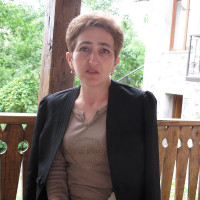We Were Even Afraid to Talk About It_

“Here people don’t speak much on the topic. It has somehow faded away. We were even afraid to talk about it.”
The forty-year-old lady we met on June 10, 2012 in the courtyard of Aksel Bakunts museum in Goris shared her perceptions and knowledge about the political repressions in Soviet Union. The young woman was aware of mass scale arrests, deportations and executions perpetrated in 1930s and 1940s, but she had a vague understanding of how these were implemented. She spoke of people getting arrested for a handful of wheat but she did not have answers as to whether the arrests and persecutions were targeted, why and how they happened?
H.Kh. – Do you know when the repressions took place?
– It was 1937.
H.Kh. – What about before 1937?
– There were things before but in 1937 they took larger scales.
H.Kh. – What were the grounds for repressions? Why did they repress, persecute and arrest the people?
– Well, it must be because the authorities wanted to secure their power. They probably did it to frighten the people, so that they couldn’t express their opinion.
H.Kh. – Whom did they take? Were those people dissatisfied with the authorities? A little while ago, you said that people were arrested for only a handful of wheat.
– No, no, I think they did it just to frighten the people. I think so.
H.Kh. – You reckon they were driving people to their deaths only to scare them? Can you recall any story about such arrests?
– I can. My father’s uncle was taken, persecuted. He was from Kapan, Lernadzor village. He was the village storekeeper. They say, he was a very honest man. Nobody could snatch away anything from the storage. He worked accurately and nobody was able to steal anything from there. This is what people used to tell. Once the head of the village council ordered him to write something off the storage list, but he refused. A few months later, they brought fake accusation against him, as if he had disseminated slander about Stalin’s regime. I don’t know what exactly the slander was. Most probably, he didn’t do it but the informers who wrote the anonymous letter maintained that he had slandered Stalin. They took him away. Nobody heard about his whereabouts and he never returned. He was young and didn’t have children. Later his wife was taking care of my father and the children. She had no idea where her husband was, whether executed, exiled or dead. We know nothing. In that period, nobody dared even to speak. People in our family would only say that the whole thing was orchestrated by the head of the village council. Not only our family, many other shared that opinion but no one voiced it. Nobody ever confronted that person. He and his children lived in respect. There was no hatred towards them.
I know one more family in Goris. They are our relatives. She is a very intelligent woman. I am not sure if her family was deported or they were just killed. Here people don’t speak much on the topic. It has somehow faded away. We were even afraid to talk about it. I will ask her.
[nggallery id=16]

